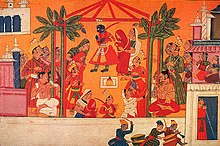Rama's Journey in Mithila is the part of Ramayana from the Vishwamitra Ashram at Buxar to the Kingdom of Mithila.
 Marriage of Rama and his brothers | |
| Folklore | Legendary Ramayana |
|---|---|
| Country | India and Nepal |
| Region | Mithila region |
| Details | Sacred places in the journey of Rama in Mithila |
Background
editIt is said that when Rama completed his Vedic education from the Guru Vashishtha, he came to the royal palace at Ayodhya. After some time, sage Vishwamitra came to the palace and demanded the princes Rama and Lakshmana with King Dasharatha for the protection of the Yajna at his ashram. After that princes Rama and Lakshmana were sent with the Guru Vishwamitra to his ashram.
Rama and Lakshman came to Vishwamitra Siddhashram to protect the Yajna of the sages. There, he killed many demons like Tadaka and Subahu during the Yajna. According to historians, Rama was not only brought to protect the Yajna, but they were also taught many lessons in weapons besides the Vedas in the gurukula of Maharishi Vishvamitra. It is said that after the completion of Yajnas at the Ashram, Vishwamitra was invited by King Shreedhwaja Janaka of the Mithila Kingdom to participate in Sita Swayamvar in his court. After that, Vishwamitra, with his disciples Rama and Lakshmana, went on a journey to the Mithila Kingdom.[1]
Journey in Mithila
editRamchaura Mandir, Hajipur
editAccording to legend, after crossing the Ganges by boat, they first came to Ramchaura Mandir in Vaishali while going to Janakpur for Sita Swayamvar. This place is located in Hajipur in Vaishali district of the Mithila region in the present state of Bihar. It is said that they were welcomed here by King Sumati of Vishala Nagari. It is believed that Rama, Lakshman and Vishvamitra rested here at a mound on the bank of the Ganga river for one night. This place is now known as Ramchaura.[2][3]
Gautam Ashram, Kamtaul
editThen they traveled towards Gautam Ashram at Ahiyari village in the Mithila region of the present Darbhanga district of Bihar. When they reached Gautam Ashram, Rama became curious to know the deserted situation of the ashram so he asked his teacher about its history. Then Guru Vishwamitra narrated the story of the curse of Ahalya and the history of Ahalya sthan at the Ashram. It is said that Rama freed Ahalya from her curse there.[4]
Vishwamitra Ashram, Bisaul
editAfter that they went to Bisaul village near the city Janakpur of Mithila. It is said that in Bisaul village there was a royal mango garden, where King Janaka built an ashram for the residence of the sage Vishwamitra in Mithila. This place is called as Vishwamitra Ashram, Bisaul. Rama and Lakshmana with his teacher Vishwamitra stayed here.[5]
Phulhar
editNearby the ashram, there was a royal flower garden in Phulhar, where Rama and Lakshmana went to pick up some flowers for their teacher to worship. In the same garden is the Girija Devi temple, where princess Sita used to worship the goddess Girija Devi. It is believed that the first meeting of Rama and Sita took place in this garden while flowers were being picked there.[5]
Janakpur (Capital of Mithila)
editAfter resting at Bisual, Rama and Lakshmana with their teacher Vishwamitra went to court of King Janaka at Janakpur where Swayamvar Sabha for the purpose of marriage of princess Sita was organised. In the competition of Swayamvar ceremony prince Rama was declared as the winner.
Manimandapa
editAccording to legend, in Mithila, after winning Swayamvar Sabha at the court of Janaka, Rama, along with his other three brothers, were married at Manimandapa.[6] After the prince Rama broke the bow at the court of Janaka, the procession for marriage came from Ayodhya. The place where the altar and sacrificial pavilion (Yajna Mandap) decorated with gems was built for the marriage in Janakpur is near Rani Bazar known Manimandapa. In the campus of the shrine there is a pond where the feet of the four brothers were washed at the time of the marriage.[7]
References
edit- ^ "जानिए सीता तक कैसे पहुंचे श्रीराम:विश्वामित्र की धरती बक्सर से शुरू हुआ सफर, बिहार में 350 किलोमीटर यात्रा के बाद पहुंचे जनकपुर". Dainik Bhaskar.
- ^ Bharatvarsh, TV9 (2022-05-13). "राम 'राह': अयोध्या से नेपाल तक की यात्रा.... जहां विश्वामित्र और भाई लक्ष्मण के साथ रघुवर ने रखे थे अपने चरण". TV9 Bharatvarsh (in Hindi). Retrieved 2024-06-29.
{{cite web}}: CS1 maint: numeric names: authors list (link) - ^ "Hajipur: रामचौरा में पड़े थे मर्यादा पुरुषोत्तम श्रीराम के चरण, आज भी विद्यमान; हो रहा भव्य मंदिर का निर्माण - Shri Ram Navami 2023: Shri Ram visited Ramchaura along with Laxman His foot mark is still preserved here in Hajipur Bihar". Jagran (in Hindi). Retrieved 2024-06-29.
- ^ "इस मंदिर की पुजारी है महिला, भगवान राम के चरणों से यहां हुआ था चमत्कार". Navbharat Times (in Hindi). Retrieved 2024-06-29.
- ^ a b Sangam, Ravi (2020-09-08). अयोध्या से मिथिला तक (in Hindi). Shangum Mass communication Pvt. Ltd.
- ^ "Mani Mandap: a hidden gem in Janakpur". kathmandupost.com. Retrieved 2024-06-29.
- ^ "जनकपुर में है सीता-राम विवाह का मंडप और वो जगह जहां श्रीराम ने धनुष तोड़ा". Dainik Bhaskar.